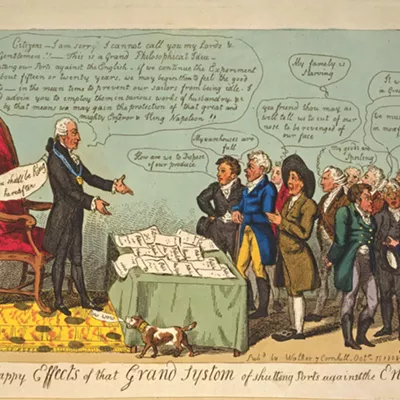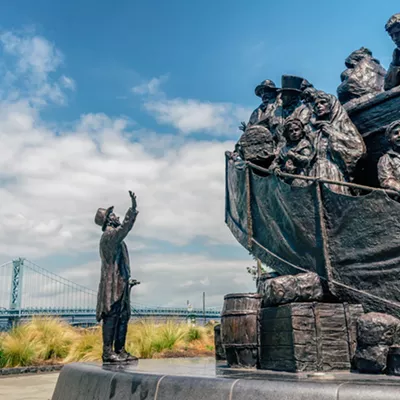What if on Jan. 6 the Secret Service had obeyed Trump's profane injunction, "I'm the f—ing president! Take me to the Capitol now!" With a horde thrashing the guardians of our Acropolis, what would Trump have done and how might this dark day have turned out differently? Do you ever wonder why history turns out the way it does? Some believe that history is not arbitrary but rather subject to eternal laws.
The traditional Chinese view is that history reflects the seasons, an endless cycle of growth, fruition, decay and regeneration. Buddhists regard history as a repetitive circle of birth, death and rebirth (Samsara) from which one seeks to be free through Nirvana, the cessation of desire — hence the end of suffering. Ancient Greeks believed learning from history was requisite for improving oneself and the polis, today a central tenet of the liberal arts.
Medieval Christian thought was guided by Augustine's notion that the humanism of the ancients ("City of Man") was a necessary historical stage that humanity was compelled by God to endure, while subsequent history was a hair-shirt preparation for the "City of God." Marx insisted that history was a conflict between opposing economic classes ultimately resolved by the end of history — communism.
What Augustine and Marx share is that nothing in history is by chance. History is predetermined and linear, each advancing to an appointed utopian destination — one heavenly, the other an earthly delusion eventually rationalizing the murder of millions by Stalin and Mao.
Whether part of a transcendent plan or the caprice of a random universe, there are definitive events that could have turned out differently and thus altered the course of history. These are the "what ifs" of history. The actual outcomes of these events were not inevitable and more probably could have been contrary. It is intriguing to ponder some of these plausible alternative scenarios and how fragile our historical fates.
GREECE 5TH C. B.C.E.
The formidable Persian army incinerates Athens and occupies the Parthenon. In 480, the Athenians improbably rout the Persians in the naval battle at Salamis. What if the Persians had conquered Greece? Would Greek democracy, philosophy, literature and art that define Western culture exist?
ROME 3RD C. B.C.E.
Rome is not yet an empire, rather it only occupies the Italian Peninsula. In 241, Rome acquires Sicily through war with the Mediterranean superpower Carthage. In 218, Carthage retaliates as Hannibal crushes Romans in Spain and, with 40,000 soldiers and 37 elephants, crosses the Alps. Along the way, he loses half his soldiers, all but seven elephants and his one eye. (See J.M.W. Turner's 1812 painting,"Hannibal Crossing the Alps.") Despite these deficits, Hannibal demolishes the Romans in southeast Italy, annihilating 70,000 in one day. With Rome defenseless and panicking, rather than march on the city, Hannibal halts. Hannibal's repose allows the Romans time to blockade Carthage's winter provisions, and Hannibal's allies defect to the Romans as his troops ravage Italian towns. What if Hannibal had pursued his advantage and conquered Rome. Would the Roman Empire have been pre-empted?
VIENNA 1241
A rapacious Mongol horde of 200,000 fortified with fermented yak's milk swarm across the frozen Danube determined to decimate Vienna. Historian Timothy Snyder says, "No European army could have kept Mongols from reaching the Atlantic." One fortuitous death grants Europe a perpetual reprieve: The Great Khan dies, and the Mongol general withdraws from Vienna to the Mongol capital Karakorum in order to choose a new Khan.
CHINA 1405-1433
The Ming eunuch Zheng He commands a flotilla of 28,000 sailors on 300 ships, the longest of which was 400 feet. By comparison, Columbus in 1492 had 90 sailors on three ships, the largest of which was 85 feet long. Zheng He's fleet is equipped with navigational equipment, accurate maps and gunpowder cannons, all unknown to Europeans. Zheng He penetrates west to the Persian Gulf and could easily round the Cape of Good Hope and conquer Europe, its population diminished by two-thirds by plague and paralyzed by war. Abruptly the fleet is recalled and destroyed by the Ming emperor who forbade any further voyages, thereafter China retracting from foreign conquest.
MEXICO 1519
The Aztec king Montezuma believes that Hernan Cortes is the Aztec god Quetzalcoatl. Venerating Cortes with gifts of gold and thus disarmed, the Aztecs are unaware that the "white god" will, according to a Mayan prophecy, "castrate the sun and bring the night." With its guns, germs and steel, 500 Spaniards conquer 200,000 Aztecs. (See Mexican director Rodrigo Reyes' 2020 film 499.) By the mid-16th century, Spanish-imported disease alone annihilates 80 percent of the Aztec population.
MOSCOW 1941-1942
Within a few months of invading the Soviet Union in June 1941, the Nazi blitzkrieg is within 10 miles of Moscow. (See the 1957 Soviet film The Cranes are Flying.) So confident that the Germans would shortly take Moscow, Hitler does not equip soldiers to fight a winter campaign. Even by Russian standards, the early winter is brutal. Hitler demands that his military press the offensive rather than retreat. Did Hitler not recall Napoleon's undoing by the fierce 1812 Russian winter (Turner's painting is a veiled allusion to Napoleon's disaster.). Like the French, the German war machine never recovers and even though the Nazis launch other Soviet campaigns, including the Battle of Stalingrad of 1942-1943, they are never so close to winning the war as when they are at the gates of Moscow. The ill-conceived Moscow campaign is Hitler's Waterloo.
We can only speculate about what might have been had the Persians, Carthaginians, Mongols, Ming and Nazis triumphed, or whether the Aztecs could have resisted the acquisitive savagery of Spanish manifest destiny, yet perhaps as Schopenhauer observed, "Fate shuffles the cards and we play." ♦
John Hagney is a retired history teacher, spending 45 years at Lewis and Clark High School. He was named a U.S. Presidential Scholar Distinguished Teacher and published an oral history of Mikhail Gorbachev's reforms that has been translated into six languages.























